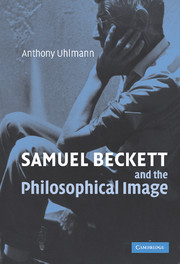Book contents
- Frontmatter
- Contents
- Acknowledgements
- Introduction
- 1 Representation and presentation: Deleuze, Bergson, Peirce and ‘the image’
- 2 Beckett's aesthetic writings and ‘the image’
- 3 Relation and nonrelation
- 4 The philosophical imaginary
- 5 Cogito nescio
- 6 Beckett, Berkeley, Bergson, Film: the intuition image
- 7 The Ancient Stoics and the ontological image
- Conclusion
- Notes
- Works cited
- Index
7 - The Ancient Stoics and the ontological image
Published online by Cambridge University Press: 22 September 2009
- Frontmatter
- Contents
- Acknowledgements
- Introduction
- 1 Representation and presentation: Deleuze, Bergson, Peirce and ‘the image’
- 2 Beckett's aesthetic writings and ‘the image’
- 3 Relation and nonrelation
- 4 The philosophical imaginary
- 5 Cogito nescio
- 6 Beckett, Berkeley, Bergson, Film: the intuition image
- 7 The Ancient Stoics and the ontological image
- Conclusion
- Notes
- Works cited
- Index
Summary
‘MAKE SENSE WHO MAY’
An obituary of Beckett written by Alfred Simon was published in Le Monde on 27 December 1989. With Beckett's French contemporaries, and perhaps Sartre in particular, in mind, Simon wrote:
It has been generally believed that Beckett's oeuvre is a stranger to any political preoccupation. In virtue of the axiom ‘to be apolitical is to be right-wing’ inflexible members of the doctrinal Left even attempted to pass Beckett off as a writer of the Right. More subtle than these, Cioran was correct to see him as ‘one of those who consider that history is a dimension through which man must pass’. Alas, here is yet another self-evident truth that will need to be revised! Lately we have seen him take the side of certain individuals: Arrabal, Vaclav Havel and even Jack Lang! His recent dramatic works, like Catastrophe and Quoi où [What Where] are the politically engaged works of an author who fled from politically engaged literature; they are the most highly political plays of the recent period.
While I won't be discussing Catastrophe in this chapter, one might claim that, leaving aside its genesis as a work commissioned in support of the Czech playwright Vaclav Havel, who was then being held as a political prisoner, it has in common with What Where an interest in violence and violent relationships, as both involve torture, of the body and spirit.
- Type
- Chapter
- Information
- Samuel Beckett and the Philosophical Image , pp. 129 - 146Publisher: Cambridge University PressPrint publication year: 2006



